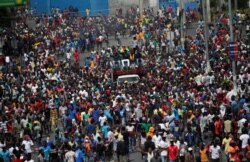Arthur Jean Pierre contributed to this report in Port-au-Prince.
Thousands of protesters were in the streets of Haiti's capital Friday, marching toward the affluent suburb of Petionville where they say they will wait for the President Jovenel Moise's letter of resignation.
"Jovenel can't remain in the country, he has to go!" a protester yelled as he made his way up the mountain from the Champ de Mars neighborhood, not far from the National Palace in Port-au-Prince.
"We don't have a problem with the man — we don't know him — we have a problem with the system (of government). We're fighting for a new society and a better life," a protester marching in the downtown area of Carrefour Aeroport said. "We have to rid ourselves of this economic morass."
The opposition and anti-corruption groups called for citizens nationwide to fill the streets to continue pressuring the president to resign. They blame him for failed leadership, a fuel shortage, high inflation and rampant corruption.
"The police know where we're heading," opposition Senator Nenel Cassy told VOA Creole as he marched uptown. "We have protesters coming from different areas of the capital and we will merge at Place St. Pierre (in Petionville). And if they (the president) don't bring us his resignation letter, we will head up to Pelerin."
Cassy said the opposition has sent word to protesters coming down the mountain from Kenscoff, an agricultural town, to stop when they get to Pelerin 9, and wait there for a signal to continue down the mountain to the president's home.
A week ago, when protesters tried to make it to Petionville, they were dispersed by security forces firing tear gas.
Asked by VOA Creole what they plan to do if they are allowed to reach Moise's home, opposition leader Andre Michel skirted the question.
"I don't think we'll have a problem," Michel said. When pressed, however, about whether they planned to resort to violence, he said, "Listen, we are a Republican opposition, we are a Democratic opposition, functioning within the confines of the Constitution of the Republic. Everything we do, we always invite the police (to come along)."
When VOA Creole arrived in Petionville around midday, two armored police trucks were blocking the main road leading to the president's neighborhood. A large crowd was gathering in the middle of the street.
"We're at the edge of the abyss," a protester told VOA Creole, likening the current political climate to that which existed in the 1960s under dictator Papa Doc (President Francois Duvalier) whose Tonton Macoute henchmen terrorized the nation.
"When the government reaches this stage, it means it's reached the end. This is an uprising, not a protest," the protester said.
Haiti has been plagued for months by an increase in violence, a fuel shortage, high inflation, double-digit unemployment and food insecurity.
Weekly protests have negatively impacted businesses, schools and tourism.
Moise has taken steps toward resolving the crisis. Last week, he named several new Cabinet ministers and formed a special commission tasked with facilitating a national dialogue to negotiate an end to the crisis — an idea backed by the international community.
"This is a situation that requires political wisdom," former Prime Minister Evans Paul, a member of the commission, told VOA Creole. Describing the current political climate as "extremely serious," he said the root cause of corruption dates back to long before Moise took power in 2017.
"We're all part of the problem, so let's put our heads together to be part of the solution," Paul said.
But the opposition and their supporters refuse to back down and say they will accept nothing less than the president's resignation.





